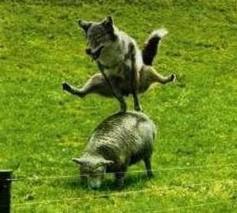Salve!
Ecco la frase idiomatica della settimana = Here’s your weekly Italian Idiom, brought to you by Italiano With Jodina:
In bocca al lupo!
Literally, this means “in the wolf’s mouth” and is used to wish someone luck, as with “buona fortuna.” In bocca al lupo is similar to the expression, “Break a leg,” except that it’s used in any situation, not just in acting or performance settings.
There is also a response sometimes used when someone tells you “in bocca al lupo,” and that is, “crepi il lupo” — literally meaning “may the wolf kick the bucket.” It would be like saying, “Yes, when I put my head in the wolf’s mouth, may it drop dead” (rather than biting my head off!) . . . a metaphor for coming out on top in the face of a difficult or challenging situation.
Have a great week, and in bocca al lupo!




Grande! finalmente svelato in inglese il mistero della bocca del Lupo.. ci metto sempre delle ore per spiegare l’idioma.. ora, grazie a te, posso smplicemente dire.. visita Italiano With Jodina
Ne sono contento! Here’s something we say in English to wish someone good luck with a performance (actors, singers, speakers, etc): “Break a leg!” Language is so crazy, but fun!
i used to hear my parents say, “manca le cani”. i think that’s it….forse, no? i thought it might mean not even the dogs….perhaps: who would eat that gross stuff?…not even dogs would. love your site, marianna ricci-wilson
Ciao Marianna~
Thanks for the compliment — glad you enjoy the site! That’s my mission 🙂
Yes, I’ve heard this phrase as ‘manco i cani’ in the area of Milan. It’s said slightly different ways in different regions of Italy. And you’re right on the meaning… even a dog wouldn’t eat that, or you wouldn’t even treat a dog like that. In standard Italian it’s ‘Neanche ai cani…’
Jodina
That is such weird expression to mean good luck, isn’t it? I think it comes from the fortune a wolf has after he captured a prey.
Larry
Ciao Larry,
infatti (in fact) it is an odd expression to say “good luck”… but that’s idioms for you… consider the English expression “break a leg”!
Jodina
Ciao Larry!
It is like saying to someone who has to go to do something very difficult or challenging “good luck”. The wolf is like the challenging thing, and you have to face it head on (or put your head in it). The reply to In bocca al lupo is “Crepi il lupo” or just simply “Crepi”– which is saying that “May the wolf keel over (rather than eat your head) and therefore wishing you a successful outcome, aka “Good luck”!
Jodina
I thought you might like to know where “break a leg” comes from: at the end of a play, they drop the theatre curtain and then raise it again for the actors to come out and take a bow (called a “curtain call”). The curtains were weighed down at the bottom with little wooden blocks (called feet) to make the curtain hang straight. The idea was that if the play was REALLy good; the audience would applaud the actors so much they’d have to take lots of “curtain calls” and the curtain would come up and down so much it would break one of the “legs” attaching the little wooden feet to the curtain! Not quite as weird when you understand the meaning!
I always thought “in bocca al lupo” must come from the little red riding hood story (I can’t remember what it’s called in Italian) – but i don’t know why i thought that. I bet it has a good explanation anyway!
What a cool story — I’ve done plays myself and used the phrase “break a leg” and had no idea of the origin.
When I hear “in bocca al lupo” it conjures up an image of a lion tamer type of situation, except that it’s a wolf, and the tamer has to go inside the mouth, and the wish is that it will drop dead rather than bite the tamer’s head off!
Ciao jodina,
ma la traduzione esatta di “keel over” quale sarebbe? Perché “crepi” vuol dire semplicemente morire…
Irene
Ciao Irene,
ho usato “keel over” piuttosto che “die” perche’ crepare in italiano e’ una parola molto piu’ popolare che morire che ha anche i seguenti traduzioni: to croak, to pop off, to kick the bucket, to peg out, to snuff it. Crepa! is like saying “drop dead!”
Jodina
Ciao. My cousin who grew up in Mosciano Sant’Angelo in Abruzzo says that one wishes someone a good journey by saying in bocca al lupo.
By the way Little Red Riding Hood is translated Cappuccetto Rosso in italian.
I have heard of different explanations for the In bocca al lupo idiom. One is that mother wolf protects her pups by picking them up with her mouth and moving them from one place to another, hence symbolizing protection. So being in the mouth of the wolf wouldn’t be such a bad thing!
Ciao Ermanmno, this is very interesting. I haven’t heard this before, and I like it a lot… un augurio of protection in the face of something challenging… but then we still have the common reply of “Crepi il lupo” that still sees the poor wolf dying! A the richness of language and humans who create it — proprio affascinante!
very good info and comments. i’m an actor, and have loved the expression in bocca al lupo. just recently learned about crepi. grazie. gino
Quoto Ermanno..!
Credo che poi nel tempo, si sia un po’ perso il significato originale, fino a fraintendere totalmente il detto, ed arrivare alla risposta “crepi il lupo”.
Mia madre risponde sempre “grazie!”
Thank you for this most useful and unique way to wish people well in performing. I have never liked using “break a leg,” for concert performers. “In bocca al lupo,” is my new favorite!
I spent a couple of years in Rome and I was told that ‘in bocca al lupo’ referred to the wolf who rescued the infants, Romulus and Remus, who were supposedly the founders of Rome. Hence, ‘going into something that appears threatening, but finding unexpected good fortune’.
The story I was told is that “in bocca al lupo” refers to the mythical story of the brothers Romulus and Remus who were protected by the ‘she-wolf'(a mother wolf, when threatened, will often carry her pups in her mouth to move them to a new den) and the response ‘crepa’ refers to the killing of Remus by his brother for taunting/teasing him (meaning that, should the person who is giving the compliment be doing so sarcastically, they too should die)
‘In bocca al lupo’ may relate to St Anthony the Abbot and the miracles attributed to him. One such legend includes a young mother seeing a wolf with her baby clenched in its jaws and after she prayed to St Anthony, the wolf released the baby, unharmed. A similar account involving a baby being released from a wolf’s mouth provides the origin of an Italian food fest tradition called “Panarda.”
In bocca al lupo is the “well wish” of all Italian Opera Companies, and those in the US (Chicago Lyric, Metropolitan, San Francisco) who predominantly perform Italian works. Being a professional opera singer for 50 years, I heard it from the first Italian colleagues with whom I performed and has become the most popular of all “good luck” phrases. In the opera world, it is said to have been derived from the “sweet spot” or acoustic marvel, that exists on the stage of La Scala in Milano (Italy’s most prestigious Opera House). The spot is located about 15 feet back from the rim of the stage which is convex. Standing there, as I have, it appears (with the footlights) as though you are literally standing in the mouth of a wolf. The phrase was said in order to remind singers to go to that spot in order to have a boost from natural acoustic. Also, in standing there you would be safe, should the wolf want to eat you. You are far enough back from the teeth (fangs) that the wolf could not bite and chew you. La Scala audiences are notoriously critical of singers who grace their stage. They can “chew you up and spit you out!” There are a number of explanations above I like. This one is known by every opera singer for the past 200 years.
I was taught this version: as long as the wolf has caught his prey I his mouth, you will be safe. The wolf will not drop his prey to bother you, he’s already occupied and “content.”
E` vero anche questo! True… rather some other prey than you!